Beekeeping in a busy city centre? It doesn’t sound right to me, but there’s a growing trend to put beehives on the vacant roofs of city centre shops and museums. I recently had a chance to find out what’s behind this trend when bees arrived on the Princesshay shopping centre in Exeter. There are now three beehives on the roof of this busy shopping complex, so on a recent warm day in early July I went to meet the bees and their keepers.
Exeter’s Princesshay shopping centre
The idea for the Princesshay bees came from Andrew Littlejohns, the Operations Manager of the complex. Having seen a television programme about the decline of bees, he decided to try to help. His plan was to set up honeybee colonies on the roof of the shopping centre along with a bee-friendly garden. The garden, with its raised beds and an irrigation system, was built in 2012 and left to mature until spring this year when the first bees arrived.
The roof garden
Andrew took me up to the roof in the service lift through parts of Princesshay most shoppers don’t normally see. We stepped out of the lift into the newly constructed beekeeper’s room complete with posters about beekeeping and a full set of beekeeping apparatus and clothing. I also met Jason Wallis from WeeTree Nurseries in Somerset who is the Princesshay beekeeper. Jason visits once a week to check the bees and to train volunteers.
Once we had all “suited-up”, I went with Jason, his son and two Princesshay volunteers to see the garden and the bees. The roof space is, as you might expect, rather bleak although there are now plenty of flowers in bloom. The bees were very active on this warm day and I looked in to the hives and watched Jason and his helpers identify, mark and clip the queen in one hive. Jason fed another hive and told me that his aim is to get three strong colonies established this year with two more hives to be added next year. When the colonies can spare honey and beeswax, this will be sold through the Chandos Deli located in the shops below.
A rooftop hive with active bees
It was a very interesting visit but I was left with a lingering unease about the project. Is the city really the place to keep bees with its pollution and apparent lack of forage? Is this some kind of indulgence, the “save the planet” hobby as beekeeping has been dubbed by some? Do I detect a whiff of middle class guilt?
Although these are Devon’s first city bees, the idea is by no means a new one. One of the most prominent colonies of city bees in the UK was established in London in 2008 on the roof of the exclusive department store, Fortnum and Mason. High above Piccadilly there are four architecturally-themed designer hives; you can own one yourself for just £1500! The hives were set up with the explicit aim of producing a “single estate” honey and in recent years demand has been so high that there was a waiting list. There are bee cams should you wish to watch the bees and the regular rooftop visits with honey tasting and champagne are sold out. The bees are tended by Steve Benbow, a David Tennant/Dr Who look alike, who runs the London Honey Company. Benbow also tends hives on roofs of other London buildings including the National Portrait Gallery and the two Tate Galleries and has become something of a celebrity beekeeper.
Although some people may find Fortnum’s exclusive consumerism difficult to stomach, the bees here do seem to be thriving. Contrary to my prejudice, there is varied and plentiful forage in the surrounding parks, some of which are fittingly royal. Central London temperatures may allow a longer flowering season and the bees may be exposed to fewer pesticides compared with the countryside.
The Palais Garnier in central Paris
Fortnums got the idea for their rooftop hives from the Palais Garnier (Opera House) in Paris. There have been rooftop bees on this magnificent building since 1985; central Paris offers a pesticide-free, forage-rich environment and the bees thrive, producing more honey than their country counterparts. Winter losses for these city bees are also very low compared with bees in the French countryside. The difference may reflect the monoculture that dominates much of rural France, coupled with the use of pesticides. Ironically, the countryside, at least in France, may now be more toxic to the bees than are the towns.
So, any concerns I may have had about the health of city rooftop bee colonies seem to be unfounded, but what about the motivation behind these schemes? The Exeter city bees were set up based on a genuine desire to help support these insects but the scheme has attracted huge local publicity which can’t have been a bad thing for the shopping centre. For Fortnums, keeping bees is part of their commercial plan but may also allow the well-off to feel they are vaguely dabbling with beekeeping. In Canterbury, the city bees provide a softening for the otherwise commercial image of the shopping centre. Other rooftop beekeepers refer to “making a small contribution to saving the planet” and wanting “to connect with nature”.
Steven Poole, writing recently in the Guardian, took a swipe at the current rash of books about “walking around and discovering yourself in nature”. He linked the popularity of the books with the rise of the north London farmers’ markets. According to Poole, the books and the markets both feed on nostalgie de la boue – a French term for a kind of rustic-fancying inverted snobbery which literally means “nostalgia for the mud”. Are the city bees part of this? They may be, although in my view, Poole’s criticism of farmers’ markets is simplistic.
Down here in Devon, farmers’ markets are very popular. Exeter has a regular Thursday market and The Real Food Store in the city centre specialises in local produce. There may be mud nostalgia involved but farmers’ markets allow small producers to sell independently of the big supermarkets and give consumers the chance to buy fresh, high quality produce and support the local economy. The produce on sale reflects the seasons so consumers may feel a slight connection with nature.
One caveat: it’s very important that people don’t think that shopping at the farmers’ market, or indeed keeping bees, is all they need to do to support the environment. The environment is under great pressure from climate change, from pollution and from industrialised farming, to name but three threats. The environment needs all the support it can get.
[The photographs were taken by Hazel Strange]

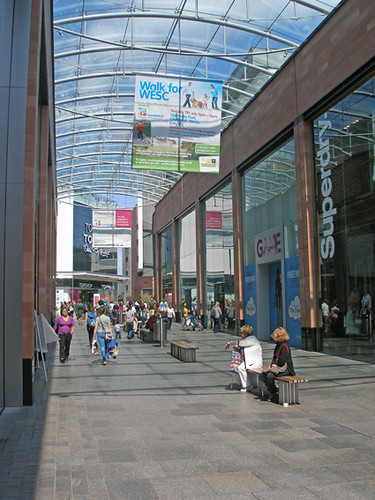
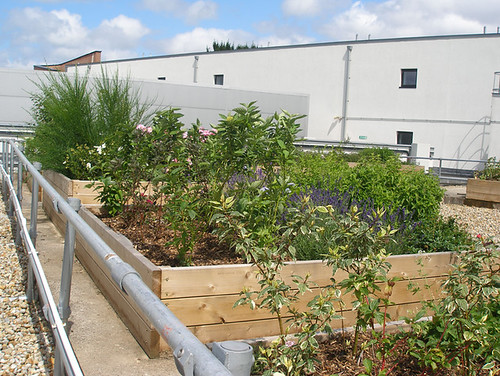
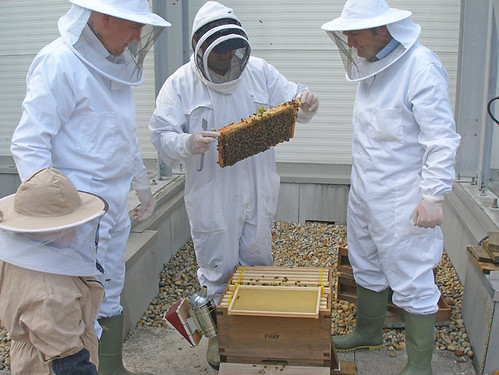
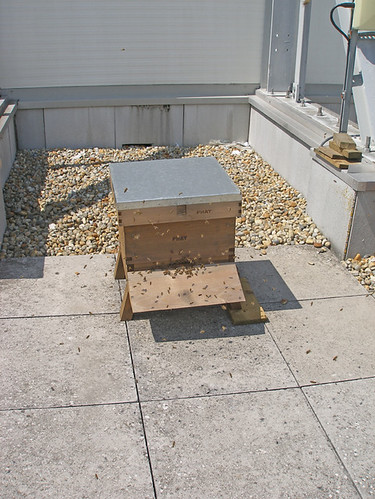
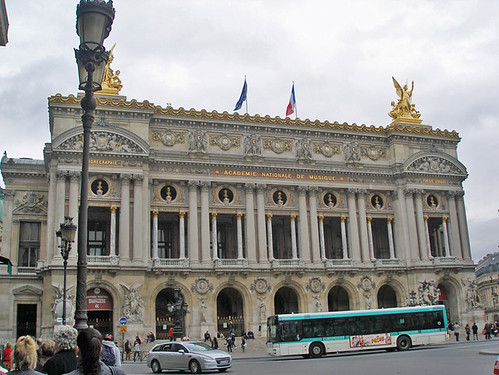
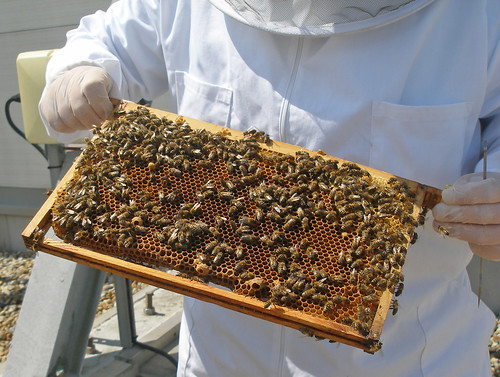
Can I encourage people, unless they actually want to produce their own honey, instead to create habitats for bumble bees and solitary bees. These are great pollinators and some species are endangered, so need all the help we can give them. The danger of thinking only in terms of honey bees is that, like a monoculture, it increases the danger of our pollinators being wiped out by a single disease or parasite.
I agree with you completely; some of the recent “save the bees” campaigns have emphasised honey bees too much. Habitat creation in towns and in the countryside would do a lot for the bumblebees and solitary bees.
At least the government is now talking about a “national pollinator strategy” which suggests a broader view.